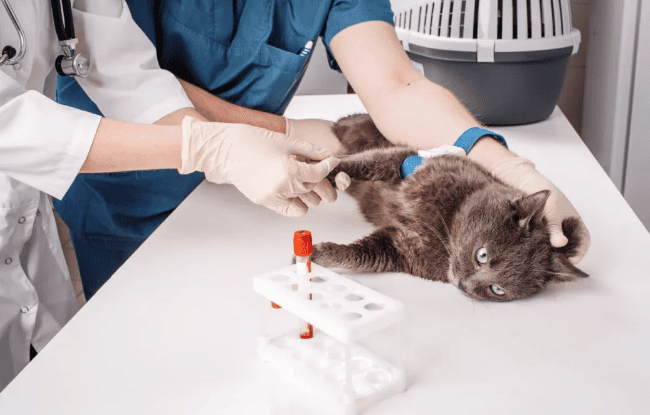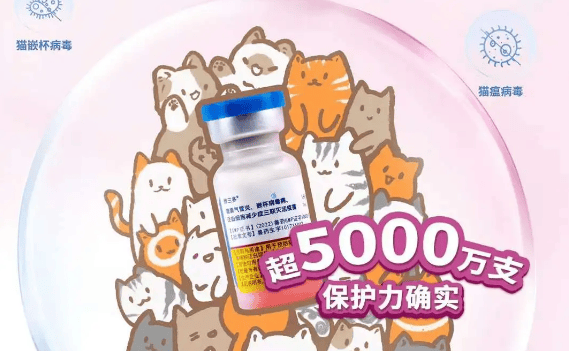Antibody testing is an important tool for assessing your cat’s immune status. Only after the cat triple vaccine is properly vaccinated, the cat's immune system will produce corresponding antibodies. By testing cats’ antibody levels, we can better understand their immune status.

What is antibody testing
p>Serum antibody titer testing is a method of measuring your cat’s antibody levels to certain pathogens (disease-causing organisms). Antibodies are Y-shaped proteins produced by B cells when stimulated by antigens (toxins, foreign bodies or pathogens that trigger an immune response in the body, especially antibody production). By performing a titer test, you can understand your cat’s immune status and determine whether additional vaccinations are needed.
The role of antibody testing
Cat antibody testing has certain reference significance for evaluating the effectiveness of vaccination, identifying individuals with immune failure, and determining immune needs. Helps keep cats healthy and provides them with better immune protection. Therefore, antibody testing can be recommended to pet owners after cats are vaccinated to understand the pet’s immune response to the vaccine.
·Assessing immune effectiveness
Antibody testing can provide an accurate assessment of the effectiveness of vaccination. By measuring antibody levels in cats, we can determine whether the vaccine successfully induced an immune response. This helps ensure that your cat is adequately protected and less susceptible to disease.
·Identification of individuals with immune failure
Antibody testing can help identify individuals with immune failure. In rare cases, a cat is vaccinated, but for various reasons, its immune system fails to produce sufficient antibody levels, resulting in immune failure. With antibody testing, we can detect these situations in time and take the necessary steps, such as revaccination or other forms of protection.
·Provide reference information
Antibody testing can also provide important information about immune deficiencies or disease history that some cats may have. For example, for cats that have had immune-related diseases or received immunosuppressive treatments, antibody testing can assess their immune status and provide guidance for vaccination.
Application scenarios of antibody testing
·Post-immunization evaluation
Post-immunization antibody testing can evaluate the effectiveness of vaccination and timely supplement immunization or adjust the vaccination plan . After kittens complete their initial vaccination program (usually around 16 weeks of age), it is recommended that a titer test be performed 4 weeks later to ensure that they have developed sufficient immunity.
·Cats with unknown vaccination history
Antibody testing can be helpful in determining the immune status of recently adopted cats with incomplete or unknown vaccination records. Test results can help pet doctors develop appropriate vaccination plans.
·Check before going out, being checked in, or hospitalized
Before the cat goes out, is fostered, checked in, or hospitalized, antibody testing can evaluate the cat’s immune status and reduce the risk of infection.
Common doubts about antibody test results
·When should the antibody test be taken?
It is generally recommended to wait 4 weeks after completing the first year of a complete vaccination program (using inactivated vaccine) before taking an antibody test. This is because it takes a certain amount of time for antibodies to form, and a small number of cats may have interference from maternal antibodies, so waiting for a period of time can ensure an accurate assessment of the cat’s antibody level.
·What do the results of antibody testing mean?
If the parvovirus result is low, a catch-up vaccine may be needed to boost antibodies. However, for herpesviruses and caliciviruses, antibody test results are of limited value. When cats have sufficient antibodies to parvovirus, many pet doctors will encounter cases where the antibodies to herpes virus and calicivirus are low and will not recommend a booster vaccine. Instead, they remind cat owners to improve their cat’s overall resistance. This is because immunity against herpes viruses and caliciviruses does not mainly work through antibodies, so antibody testing does not represent an accurate reference for these two viruses.

·Can antibody testing replace vaccination?
No. Cats need to be vaccinated to establish initial immunity, and antibody test results are used only to determine whether to receive additional vaccines or boosters.
·Can I still be infected with FPV, FCV and FHV if I have qualified antibodies?
Cats that have successfully established immunity are almost never infected with feline parvovirus. For feline herpes and feline calicivirus, cats may still be infected, but vaccination can significantly reduce the chance of illness and the risk of severe disease. For example, feline herpes virus has a probability of relapse once infected (usually mild clinical symptoms appear and then heals on its own). If a cat is malnourished, suffers from a serious disease, or is seriously contaminated by pathogens in its living environment, its antibody levels will also be affected and the risk of disease will increase.
·Why do I need booster shots every year after taking an antibody test?
The purpose of antibody testing is to evaluate a cat’s immune status against specific pathogens, especially feline parvovirus. Considering the high lethality of feline parvovirus, even if antibody testing shows that cats have some protection against feline parvovirus, annual booster vaccinations are still crucial. Especially for cats in high-risk environments such as frequent outings, foster care, and multi-cat households, it is very important to receive booster shots every year. Because cats in high-risk environments may be exposed to potential pathogens more frequently, annual booster shots can ensure that their immune systems maintain a high level of protection against pathogen invasion in a timely manner.
Antibody testing does not have the same meaning for feline calicivirus and herpesvirus. Still, annual booster shots are recommended just in case. This ensures that even if antibody testing does not provide complete assurance, cats are still adequately protected against potential pathogen threats.
Reference chart of recommended immunization process
Zoetis Mio Santo®️ vaccine has a highly effective protective effect and covers three common infectious diseases in cats (feline parvovirus, herpes virus and calicivirus) viruses), helping cats gain comprehensive protection and improve immunity.
How to better communicate with pet owners about antibody testing?
When communicating with pet owners, the first thing to emphasize is the importance of vaccination: against feline parvovirus, a highly fatal disease, vaccination is the most effective preventive measure.
The second is the limitation of antibody testing: Antibody testing is only a double "insurance" to ensure that the vaccine is effective, and it is only meaningful for feline parvovirus.
Third, antibody testing cannot provide absolute guarantees because the immune system's response is complex and antibody levels are not the only assessment factor. It is recommended that pet owners still take other preventive measures on a daily basis, such as maintaining good hygiene habits, regular physical examinations and annual booster vaccinations.
What vaccines must be taken? What's the best way to fight?
Cat triple vaccine is an essential vaccine for cat immunity. Miaosanduo®️, produced by an imported brand, an international manufacturer, and the Fortune 500 Zoetis Company, has been proven in China for 14 years. More than 50 million copies have provided the most secure protection for millions of cats. It has not only accumulated a good reputation in the Chinese market With successful experience and data, it has provided safe and reliable protection for countless cats around the world. Effectively prevents feline distemper virus, feline calicivirus and feline herpes virus, creating a solid health barrier for cats.
Zoetis adheres to the unified quality management system of 33 factories around the world, and strictly controls product safety and efficacy quality throughout the entire process (raw materials, production, quality inspection and transportation) to ensure the consistency of vaccine quality between batches.

 扫一扫微信交流
扫一扫微信交流
发布评论